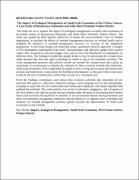| dc.description.abstract | DDAMULIRA SANYU JULIET (2010-M092-20008)
The Impact of Ecological Management on Small Scale Economies in Peri-Urban Centres: A Case Study of Bunamwaya-Namasuba and Zziba-Bussi Wetlands Wakiso District.
The study set out to explore the impact of ecological management on small scale economies in peri-urban centres in Bunamwaya-Namasuba and Zziba–Bussi Wetlands, Wakiso district. The study was guided by three specific objectives; to assess the socio-economic costs of wetland degradation, to evaluate the effects of wetland management practices on wetland health and to establish the influence of wetland management practices on incomes of the indigenous populations. A case study design was employed using a qualitative research approach. A sample of 210 respondents participated in the study. Questionnaires and interview guides were used to collect data. Frequencies and percentages were used to show the distribution of respondents on different items. The findings revealed that people decide to stay in and around the wetland areas either because they have the right in deciding on where to stay or for economic activities. The weak management practices and policies carried out around the wetland areas have given an opportunity to businessmen to degrade the wetlands for their economic benefits like industrial–small scale economies. With a high need by people to earn a living and reconcile the human food security and biodiversity conservation for livelihood development, so this gives them room since it may be the only available place within their vicinity as a catchment area.
From the findings, conclusions were drawn that economic activities like extraction of raw materials like papyrus, cultivation, industrial settings, waste dumping such as oils and garbage, scooping of sand and clay for construction and fishing have helplessly and deeply degraded and polluted the wetlands. The weak policies, low levels of education, negligence, and corruption of the local leaders who sign for people buying wetlands under the guise of developing them further boosts and accelerate the depletion of wetlands. It was recommend that the local government and other environmental management authorities should endeavour to organise more workshops and seminars on wetland management practices geared towards the improvement of small scale economies on the wetland.
Key Words: Impact, Ecological Management, Small Scale Economies, Peri-Urban Centres, Wakiso District | en_US |


